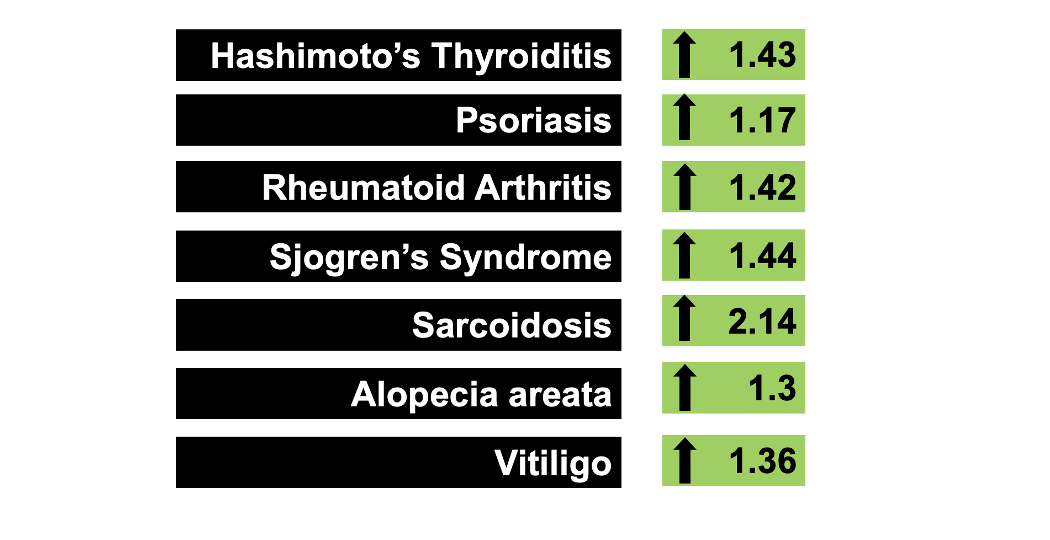Increased Risk of Autoimmune Diseases, Including Alopecia Areata, After COVID 19 Infection
New Study Again Points to Increased Risk of Autoimmune Diseases with COVID 19 Infection
It’s becoming increasing clear that patients who have COVID19 infections are at increased risk to develop autoimmune diseases. A few months ago, we reviewed the February 2023 study by Chang et al which showed the patients with COVID19 had an increased risk of developing a variety of autoimmune issues.
The Chang et al study showed an increased risk of rheumatoid arthritis (aHR:2.98, 95% CI:2.78–3.20), ankylosing spondylitis (aHR:3.21, 95% CI:2.50–4.13), systemic lupus erythematosus (aHR:2.99, 95% CI:2.68–3.34), dermatopolymyositis (aHR:1.96, 95% CI:1.47–2.61), systemic sclerosis (aHR:2.58, 95% CI:2.02–3.28), Sjögren's syndrome (aHR:2.62, 95% CI:2.29–3.00), mixed connective tissue disease (aHR:3.14, 95% CI:2.26–4.36), Behçet's disease (aHR:2.32, 95% CI:1.38–3.89), polymyalgia rheumatica (aHR:2.90, 95% CI:2.36–3.57), vasculitis (aHR:1.96, 95% CI:1.74–2.20), psoriasis (aHR:2.91, 95% CI:2.67–3.17), inflammatory bowel disease (aHR:1.78, 95%CI:1.72–1.84), celiac disease (aHR:2.68, 95% CI:2.51–2.85), type 1 diabetes mellitus (aHR:2.68, 95%CI:2.51–2.85).
Tesch et al 2023
A cohort study from Germany showed similar findings to what was shown in the Chang study, namely that patients with COVID19 are at increased risk to develop autoimmune diseases. Tesch et al matched 641,704 patients with COVID-19 in a 1:3 manner with control patients without COVID19. Here, Tesch et al found a 42.63% higher likelihood of acquiring autoimmunity for patients who had suffered from COVID-19. These autoimmune diseases included conditions like Hashimoto thyroiditis, rheumatoid arthritis, and Sjögren syndrome. The highest IRR was observed for autoimmune diseases of the vasculitis group. The risk of developing autoimmune diseases was higher in older individuals than younger individuals and was higher in those who had more severe COVID19 infection (such as being in hospital or the ICU) than those with less severe infection.
Specific rates included an increased risk of Hashimotos’ thyroiditis 1.42 (95 % CI 1.33-1.59), psoriasis 1.17 (95 % 1.09–1.26), rheumatoid arthritis 1.42 (95 % 1.30-1.56), Sjogren’s syndrome 1.44 (95 % 1.27–1.63), sarcoidosis 2.14 (95 % 1.73–2.65), alopecia areata 1.30 (95 % 1.05–1.61), vitiligo (95 % 1.36 1.05–1.77). The risk was particularly high in Behcet’s (95 % 2.42; 1.10–5.35), Wegener’s (95 % 2.51; 1.42–4.46 and Temporal Arteritis (95 % 1.63; 1.05–2.53).The risk of systemic lupus was not found to be increased in those with COVID 19 in this study.
Conclusion and Discussion
The authors showed that in the first 3-15 months after COVID19 infections there is 43% higher likelihood of developing a first onset autoimmune disease. The authors found that the risk is highest for the “vascular” autoimmune diseases. Risks were highest in this study for Behcet’s, Wegener’s and Temporal Arteritis.
REFERENCE
Tesch F et al. Incident autoimmune diseases in association with SARS-CoV-2 infection: a matched cohort study. Clin Rheumatol. 2023 Oct;42(10):2905-2914.
Chang R et al. Risk of autoimmune diseases in patients with COVID-19: A retrospective cohort study. EClinicalMedicine. 2023 Feb;56:101783.
This article was written by Dr. Jeff Donovan, a Canadian and US board certified dermatologist specializing exclusively in hair loss.


